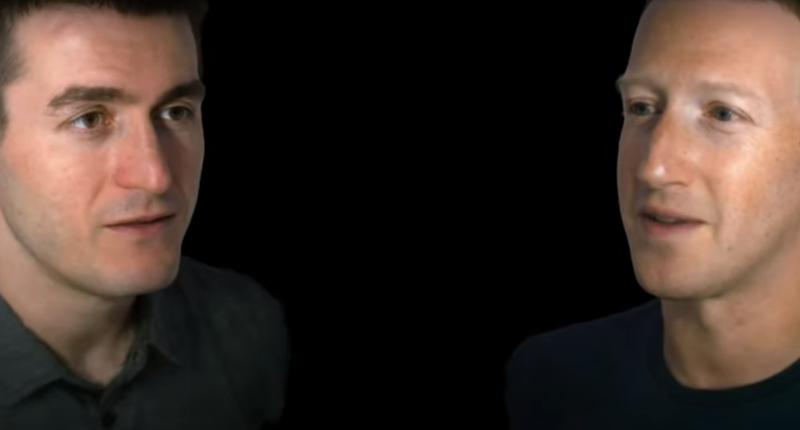FACEBOOK founder Mark Zuckerberg has been the first-ever interview subject in the metaverse, in a video that has stunned onlookers.
The metaverse is virtual world created by Zuckerberg’s tech company Meta.
When Zuckerberg first appeared in the metaverse in two dimensional form, the $177billion project was mocked widely online.
However, the tech billionaire and Lex Fridman, computer scientist and podcaster, have released a video of the pair having a conversation in the virtual world.
They look as thought they are talking face to face, and yet, are more than a thousand miles a part.
The duo appear as 3D hyper-realistic avatars, thanks to Meta’s Codec Avatar research.
READ MORE ON META
Fridman, clearly shocked by what he’s seeing, says: “It’s you. It’s really you, but you’re not here with me.”
Describing the photo-realistic avatars, he adds: “It captures everything.
“The flaws, the subtleties of the human face… it makes it all the more immersive.”
Both Zuckerberg and Fridman were scanned head-to-torso to create the Codec Avatars in Meta’s Pittsburgh Reality Lab.
Most read in Tech
So, instead of relying on cartoon avatars or video transmitting, their bodies and facial expressions have been scanned to create an hyper-realistic computer model of their appearance.
This computer model is then “collapsed” into a Codec, as Zuckerberg details.
Then, when users wear Meta’s Meta Quest headsets, the gear can see your facial expressions and send a coded version into the metaverse.
Zuckerberg describes the photorealistic experience as “magical”.
It delivers a “sense of presence as if you’re there together, no matter actually where you are in the world,” he adds.
“This experience is a good embodiment of that, where it’s like we’re in two different states half way across the country and it looks like you’re sitting right in front of me.
“It’s wild.”
Fridman goes on: “I’m almost getting emotional.
“It feels like a totally fundamentally new experience.
“Like for me to be able to have theses kind of conversations with loved ones, it would just change everything.”
No hands
However, Meta has yet to figure out how to translate arms into the metaverse or anything from the torso down, which Zuckerberg admits the company is still working on.
Fridman also notes that the scanning, while still only half of the body, was a “lengthy process”, spanning several hours.
But Zuckerberg hopes this process can be condensed down to two or three minutes and eventually completed via mobile phones – instead of a pricey trip to Pittsburgh.
“It’s one of the last pieces that we need to really nail, and then there’s all the experiences around it,” Zuckerberg continues.
“Part of the vision for this over time is not just have this be like a video call… but the thing that you can in the metaverse is different from what you can do with a phone.
“It’s doing stuff where you’re physically there together.”
Uncanny valley
The pair say they have crossed the uncanny valley line – which is a common unsettling feeling people experiences with things that closely resemble humans, but aren’t.
And onlookers largely agree.
“This is the real metaverse,” one person commented on X (formerly Twitter).
“We’ve crossed the uncanny valley!”
Another wrote: “Even five mins in, this s**t don’t even give you uncanny valley cause its full body scans, not no weird avatar.”
But others think the uncanny valley phenomenon will always follow photorealistic avatars.
“Photorealistic avatars are incredibly problematic in a metaverse context, even beyond the inevitable Uncanny Valley problem,” another tweeted.
READ MORE SUN STORIES
“They encourage toxic behaviour and are contrary to the essential expressive power of virtual worlds.”
While many think the evolution of the metaverse is both “fascinating” and “scary”, all at the same time.
Best Phone and Gadget tips and hacks

Looking for tips and hacks for your phone? Want to find those secret features within social media apps? We have you covered…












